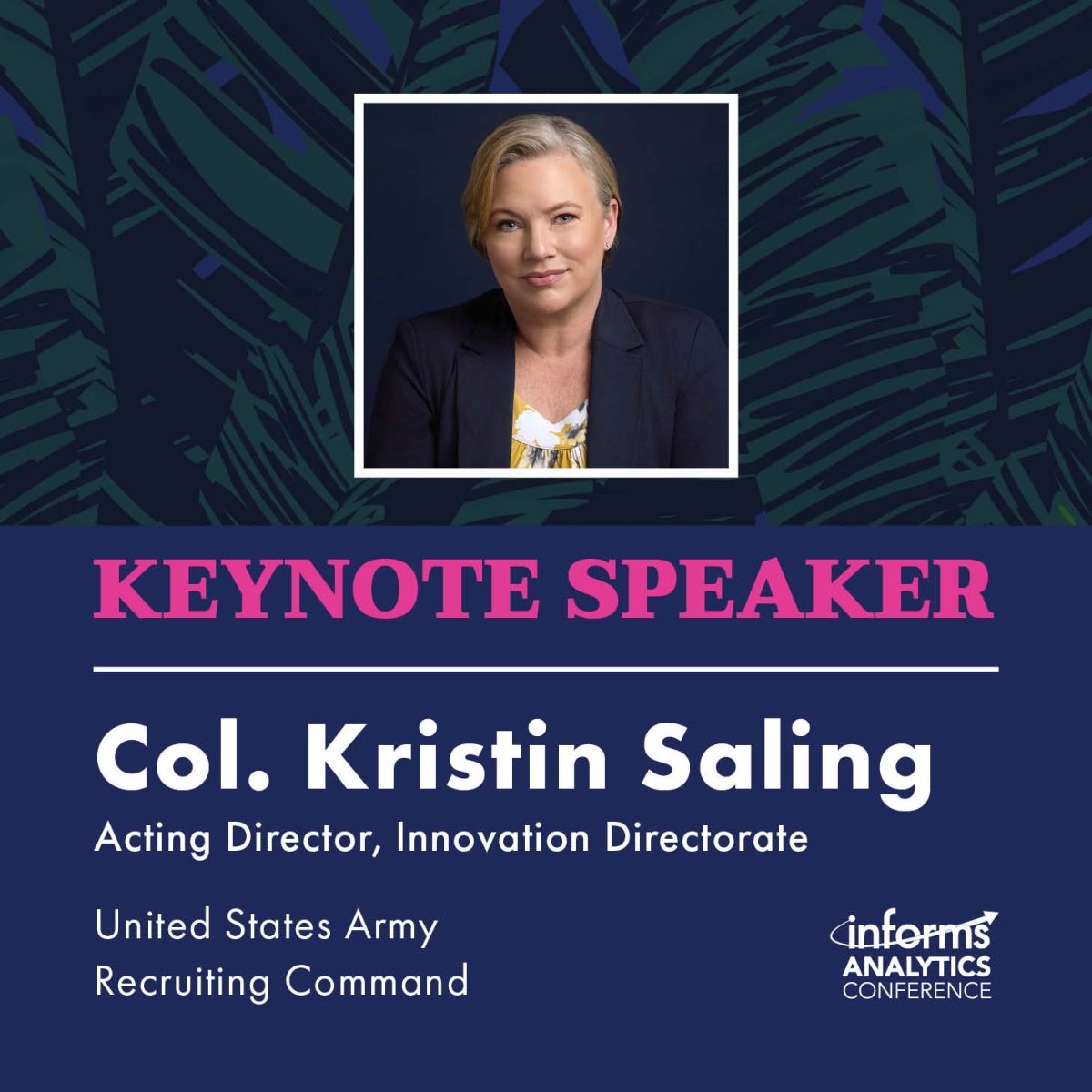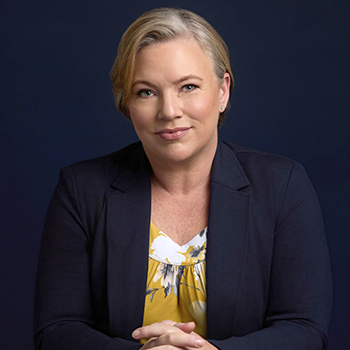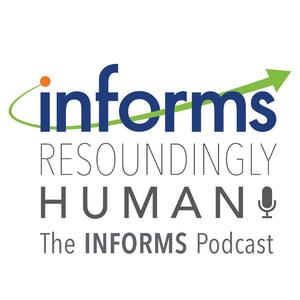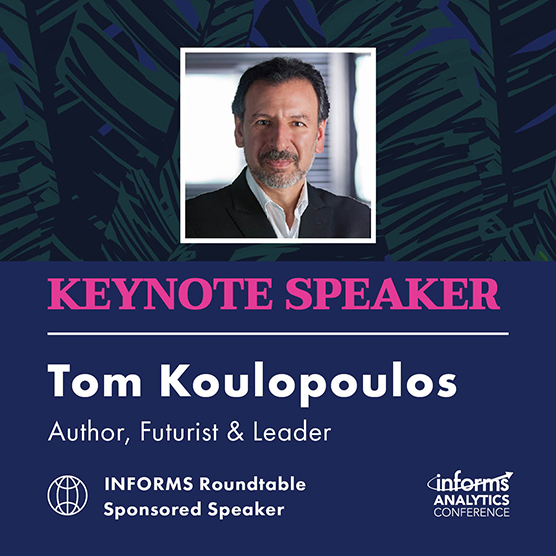Published: March 30, 2024

With the 2024 INFORMS Analytics Conference in Orlando, FL, now just weeks away on April 14-16, here at INFORMS we are looking forward to welcoming more than 700 leading analytics professionals and industry experts for opportunities to connect, network, and celebrate excellence in the field.
Joining me for a special behind the scenes look at one of this year’s conference sessions is keynote speaker Colonel Kristin Saling, Acting Director, Innovation Directorate, United States Army Recruiting Command, who has been introducing analytics, automation, and transformational business processes into Army human resources for years. She is an Army operations research and systems analyst with experience as an assistant professor at the United States Military Academy at West Point. She has led modernization programs at US Indo-Pacific Command, Headquarters Department of the Army, and is currently with Army Recruiting Command.
So to your point about collaboration, it is essential. We have got to figure out how to communicate, how to share a vision, how to build trust, I think those are the foundation of any strong team but especially with our teams because we are largely distributed. It’s a little bit different to build those elements when you’re not all sitting in the same workshop all the time.
Interviewed this episode:

Colonel Kristin Saling
2024 INFORMS Analytics Conference Keynote Speaker
Colonel Kris Saling is a recognized leader in the US Army Human Capital Enterprise who has been introducing analytics, automation, and transformational business processes into Army human resources for the past eight years.
She and her hand-picked teams of technologists and human resource subject matter experts have coordinated with the best across government, industry, and academia to pilot innovation programs at scale, including three talent management programs of record and an Army-wide data literacy program that has trained hundreds of Soldiers over the last year.
She is an Army operations research and systems analyst with experience not just in Army human resources and people analytics, but in government acquisition and contracting, data governance, personnel policy, law, and statute, and the business process of innovation. She has led significant analytic and modernization efforts at US Indo-Pacific Command, Headquarters Department of the Army, Army Human Resources Command, and now, her most challenging effort, US Army Recruiting Command, where she serves as their Innovation Director.
Colonel Saling is also publishing her first book, Data-Driven Talent Management, compiling practical and actionable insights from her years transforming Army personnel business processes. It is available this August.
Related Episodes
Episode Transcript
Ashley K: With the 2024 INFORMS analytics conference in Orlando, Florida now just weeks away on April 14th, the 16th here at informs, we are looking forward to welcoming more than 700 leading analytics professionals and industry experts for opportunities to connect, network, and celebrate excellence in the field. Joining me for a special behind the scenes look at one of this year’s conference sessions is keynote speaker Colonel Kristen Sailing Acting Director, Innovation Directorate, United States Army Recruiting Command, who has been introducing analytics, automation and transformational business processes into Army Human Resources for years. She’s an Army operations research and systems analyst with experience as an assistant professor at the United States Military Academy at West Point. She has led modernization programs at US, Indo-Pacific Command Headquarters, department of the Army, and is currently with Army Recruiting Command. Kris, I’d love to kick off our conversation by taking a look back at the start of your career and your decision to serve in the US Army and as a military brat myself, I’d like to thank you for your service.
Kris Saling: No, thank you so much for that. Oh, going all the way back to the beginning, this one is interesting because we had a few members of my family who were serving. My uncle was a reserve officer in the Army Corps of Engineers, but I didn’t know that when I first started looking at the Army, I was no typical kid. My mom was a college professor, my dad was in marketing, and we were in that unfortunate bracket where we could look at state schools, but we were eligible for absolutely no scholarships for financial aid or anything else. And I was looking at going pre-Med at the time, looking around at all of the different opportunities that I had was just like, okay, I’m not going to be able to do this without going into debt, up to my eyeballs forever. What am I going to do?
I’m not going to be able to do this program, that program, that program. And for one reason or another, someone sent me a flyer for West Point At the time, I’m no longer embarrassed to say it. I’ve been in the Army for 23 years, but at the time I didn’t realize West Point was still a modern entity. I thought I’d read about it in regards to generals from the Civil War, and I looked at it and go, oh, okay, there’s a military academy. People still use this for. Let’s look at the benefits. Ended up talking to a couple members of the field force that go out and do volunteer recruiting for the academy. And they listed out some of the benefits come in living room and board is taken care of. You get a small stipend as a cadet, and better than that, you get to come out into the Army workforce with a career. And there was a pre-med program that I could go into with potential medical training. So I’m sitting there thinking, okay, so I could do my coursework, I could do my residency, I could do my internship. I could do all of this with a paycheck and no loan. Sign me up, let’s go.
So that was the motivating factor. And then I got there. I hate to say it, it was a little bit of a legally blonde moment. I came in just sitting there. Okay, I’m all excited to join the Army. Oh, oh, there’s people yelling, okay, this is going to be interesting. Very much fish out of water. Very grateful for my roommates at the time who had both not only been around the army for a while, but had gone to the preparatory school and they fixed me up. They pointed me in the right direction and he kind of got me on the right track. But that was my somewhat ominous beginning. And from then, it is just been a absolute adventure. I have loved it. I mean, not every single minute of it. Of course, nobody loves to every single minute of their career, but it has just been so much fun.
Ashley K: So I’d love to hear more about that adventure. Could you share something about your roles with us? Indo-Pacific Command and Headquarters, department of the Army Leading Modernization Programs. What sort of challenges were you addressing?
Kris Saling: So that was interesting because those two things led into each other in a way I never imagined they would. USAID Paycom was my first duty assignment as an operations research and systems analyst. So I came in with my stock set of skills, all of my analytic training, everything that I was going to do, and found that we were still largely doing surveys in order to assess performance on the overall US paycom at the time campaign plan. I started immediately looking for better ways to do this. I didn’t want to have to sit there and aggregate surveys and do all these things manually. Started integrating new tools and new techniques into the process so that we could get more information out of our other systems and introduced more automation into our process. So I ended up working on a bunch of really cool stuff. I worked on humanitarian aid and disaster relief.
I worked on theater security cooperation. I worked on our allies and partners initiative, and those ended up getting me sent all around the Pacific Theater and doing on the fly assessment with our deployable joint Force augmentation cell, which was a ton of fun. I ended up all over the place from there. Actually, this was kind of my first step into organizational transformation, ended up with a project from the Indo Paycom chief of staff to take a look at how we were functioning. Admiral Harris, our commander at the time, wanted to do a full assessment on pay comm’s ability to fulfill its role. Hard to do that for a combatant command staff because while we do have some functional support to missions throughout the theater, most of what we do is staff actions. It’s business processes, it’s communication, it’s all of those different things. So I put together kind of a holistic assessment of how the headquarters was performing. It wasn’t kind of the kinetic action they were looking for, but it ended up working for the chief of staff to work with our folks who were doing organizational management and battle rhythm development to really get their arms around what was and what wasn’t working and how to build some mechanism to get holistic feedback on how the organization was performing and how services were delivered. So I kind of call that my first foray into customer experience.
Ashley K: Now, I’d love to take a look at your current role, which I understand is a fairly new one with Army Recruiting Command. Can you share what are some of the ways analytics and data science are being leveraged here?
Kris Saling: So that is the capstone exercise. I would say on this eight years I’ve been spending with H-Q-D-A-G one. So after Indo Paycom, I ended up in the G one in various roles. Kind of ended up doing the same thing, just finding areas where I was curious and poking into them and seeing how they could be enhanced by analytics and by experimentation. So that was kind of the genesis of the US Army Recruiting Command Innovation directorate. Our senior leaders wanted a capability that they could use to go out and quickly pilot, prototype and test different solutions without having to adopt them wholesale. So how are we going to go out and try some new technologies, business practices, processes, incentives, whatever the different elements might be with small elements of the command, and then come in, bring in the data on each of those, the performance metrics, everything else, news analytics to determine where our best ROI is. So that’s our mission set. Right now. We’ve been doing this job for exactly three months. So we’re still very much in the nascent phase. We’re a team of about eight people right now, and we’re going to go up to 45. But until then, we’ve still been able to get a couple of things off the ground so that we can build those experimental pipelines and start working with our data platforms. So
Ashley K: You mentioned the fact that you’re building a team and that it’s going to grow significantly. What do you look for when you are creating a team for this kind of work, and how important of a role does collaboration play when you’re working to implement these programs at such a large scale?
Kris Saling: This is huge. This is my favorite thing to do, is to put together these very diverse teams of subject matter experts and technical specialists and get so that we have a little bit of each and each of the projects that they work on. What I look for in the team is just kind of that variety of skill sets because we need things across the board. We need the people who are long-term subject matter experts, both in recruiting itself and in recruiting within the Army enterprise. We need to know kind of from an architectural standpoint, which walls are load bearing, so which processes are governed by policy, law and statute so that we know where we need to go for decision authorities to change those. On the opposite end, we want the folks who are really kind of busting down walls and figuring out how to use technology in new ways, figuring out how to do new business processes, figuring out how to communicate and just do business differently.
You get all those different teams together, get the ideas flowing and get the processes built, and they’re capable of coming up with some really cool stuff to test. So what I look for in those teams, along with a very broad range of skills, is a certain amount of autonomy. I want people to be able to go and investigate ideas. I want ’em to have curiosity. I want ’em to look at something that has been in place for a long time and just ask why is that there? We kind of bring in that mentality that we are there to question why we do business. We’re there to go in and kind of poke at things and see why it works. That’s where some of the subject matter experts come into play. But we also want to build those very collaborative relationships with the larger element of the command.
We’re not coming in to tell ’em that that is a major part of organizational transformation. You’re not coming in there to tell people why they’re doing something wrong. You don’t know yet. We’re coming in to investigate why they do things and try to figure out new things we can test and how to do business more efficiently. And it helps the overall organization in a way that also helps the people that we’re interviewing and building those relationships with is essential. We have got to figure out how to communicate, how to share vision, how to build trust. I think those are the foundations of any strong team, but especially with our teams, because we’re largely distributed, it’s a little bit different to build those elements when you’re not all sitting in the same workshop all the time.
Ashley K: So I wanted to take a moment to share that you’re also publishing your first book Data-Driven Talent Management. Congratulations. How does this book draw from your own professional experiences?
Kris Saling: Gracefully? I described this as just a download of everything that has been floating around in my brain for eight years of working on talent management from different aspects through our Army G one personnel office, through the assistant secretary for Manpower and Reserve Affairs office, army Talent Management, and then a little bit of my time at Army Human Resources Command. So did a ton of research, talked to a ton of experts, really worked hard on figuring out a vision for the future of talent management in the Army and ended up running around talking to different people about it at different conferences, presenting venues, academic conferences, and it’s like there’s a lot of stuff in here that is pretty universal. I mean, people are a universal element and it feels like across different services across public and private sector, we’re all dealing with a lot of the same challenges. So let me take a lot of this stuff that I was framing up from an army standpoint largely and figure out how to build the scaffolding. So if somebody else wants to do some of the things that we’re doing or we’re looking at doing, we make it very easy to do that.
Ashley K: Alright, Kris, now without giving too much away because we want people to register for the analytics conference and come see you in person, can you give us a sneak peek at what you’ll be presenting during your keynote session?
Kris Saling: So I’m talking about one of my favorite topics. It’s how we take our data and transform that into action. So especially in the people space, this has been a problem. We have collected a lot of data over the years, we’ve done analysis, but as one of my mentors likes to say, the best or the worst, analytics is the best analytics not used. So what I want to talk about is how we build, and as operations research analysts, we love this, how we build the overall ecosystem and the business process and the system of systems in order to take that analytics function, translate it over to the business side, get both of those sides talking to each other and actually turn those great insights that are coming out of the analytics into action.
Ashley K: Now, looking ahead, what do you hope is the biggest takeaway that attendees will take with them after your talk?
Kris Saling: I think there’s a number of different things they can get out of this talk. I think we’ll talk about how to manage the messy change management piece of people. Because in order to get from those analytics into action, we have to understand those business processes and some of the barriers that people are going to find no matter where they’re trying to implement a change or a new action. With those analytics, what I’d also like them to take away is that it’s not about just buying the tech. It’s not about just creating the most complicated algorithm. In fact, those two things can be very big obstacles to making progress if you don’t have the overall system built and you don’t understand the interaction of system of systems. So what I want, especially our operations research folks to take away from this is a level of confidence in their ability to make that system map happen in their ability to understand where to implement the solution, where to implement the tech, and that it’s not just about buying the latest bit of tech, it’s about having that smart or person in there to tell you how it all fits together.
Ashley K: So Kris, I’d love to change directions slightly and share some behind the scenes info on, well, when you aren’t working to the Army’s recruiting, what do you do for fun? What are your hobbies?
Kris Saling: Oh my goodness. Other than sitting on planes a lot, I do travel a fair bit, but that’s just kind of the nature of the beast for fun. I cook a lot. I mean, that’s been one of my biggest releases. My biggest just kind of get the creativity out, the frustration out. Anything else? My husband encouraged me a while ago to develop a hobby that was not work related because I’ll do my work and I’ll write my book and I’ll do a lot of things that are kind of work related, and he’s like, you need something totally separate. I don’t think he could have been more right, because doing cooking, I have a little bit of a food blog, some of those things. It allows me to exercise the creative things. I like to exercise in my job. So it’s like not only am I cooking, but I am doing math and measurement and coding and social media interaction and a bunch of other things in a totally different context. But I think having that complimentary way of stretching out my brain after a long work day, it’s like being able to take a yoga class after you do a hard workout.
Ashley K: I like that. So what is the most rewarding part of the work that you do? What makes you excited to get up each morning and tackle brand new challenges?
Kris Saling: It took me a while to really kind of find the work I wanted to do. I mean, we talked about it a little bit earlier. At first, I wanted to do pre-med. I graduated with an operations research degree. I loved the mathematics of it, I loved the science of it. I loved the applicability to so many different fields and a way to kind of exercise creativity across the space. But I really kind of struggled to find any kind of particular area in that I was passionate about until I ended up in headquarters department of the Army G one. And then I realized that this writ large was one of my favorite things that I’d loved about being a commander, and that was taking care of people so I could find new ways to develop analytics, new systems, new processes to take care of people on a very large scale.
And when you include just looking at who we have using different HR services in the Army, we’ve got our active component, our reserve, our National Guard, and our army civilians. So that’s about 1.4 million people add to it, the families and the veterans that we also still serve. You’re looking at about 4 million people. So any kind of modernization or improvement we make has a very wide range of impact that is extremely valuable. And just knowing that we’re out there and we’ve got these whole teams of people who are trying to help out our people is amazing. I love it.
Ashley K: Kris, it’s been such a pleasure speaking with you. Thank you so much for joining me and taking time out of your very busy schedule. I look forward to seeing you in person in wow, just a few weeks in. Nice, warm and sunny Orlando. Thank you so much.
Kris Saling: No, thank you. This was fun.
Want to learn more? Check out the additional resources and links listed below for more information about what was discussed in the episode.
Join us at the 2024 INFORMS Analytics Conference, April 14-16, in Orlando, FL!



